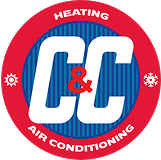Understanding the role of every component of your air conditioning system is important to getting the right service. Most people know very little about their system and do not give it much thought until there’s a problem. This is accompanied by the stress and fear of someone taking advantage of that ignorance.
Take a few minutes to learn the various parts of your system, their role, and how to know when there’s a problem. You can then relax knowing you’re in good hands and which kinds of repairs are actually needed.
Your Air Conditioning System Explained
An air conditioner is simply a circulatory system, one that circulates air and refrigerant. The air is pulled in from your home, heat is absorbed from it, and then it’s pushed back out cooler than when it came in.
To absorb the heat, the system circulates refrigerant, adjusting its pressure as it moves through the unit. When refrigerant is compressed, it intensifies the heat it contains. When it expands rapidly, it reduces that heat.
By rapidly decreasing pressure, the refrigerant can absorb the heat from the air in the system. Then, the pressure increases substantially to transfer that heat to the air outside.
It really is a very simple system in both theory and execution. However, for as simple as it is, things can certainly go wrong as the unit ages.
What You Will Likely Experience
When your system experiences a problem, you will likely have some common symptoms, regardless of the cause.
You may notice your unit running longer than normal, or even running for shorter periods but more often. You may also discover the air is warmer than normal. The humidity in your home may not be as well-controlled when the system is not working properly.
If you do not catch a problem early, you will likely see your energy bills start to climb. Increased operating costs are only the beginning of the additional expenses. If something in your air conditioner is not working properly, the rest of your system will experience additional strain.
The more strain you put on your AC unit, the shorter service life you can expect, and the more repairs. Those repairs also increase at an exponential rate when you do not catch small problems early.
Keep your eye on how your cooling system is working, and be attentive to regular maintenance and air filter changes. If you notice it is not working properly, consider some of the following and contact a repair technician.
The Coils
There are two coils that allow your air conditioner to effectively absorb heat and transfer it outside. Both coils are prone to collecting dirt and other contaminants, which prevent air from flowing over them. To keep them working properly, they should be cleaned during regular seasonal maintenance.
The evaporator coil sits inside your house, usually as part of your furnace or air handling unit. Just before the refrigerant enters this coil, it is restricted by the expansion valve. This allows it to expand very quickly, reducing the pressure and dropping the temperature. If you see these coils while the system is running, it probably looks like you have frost on them due to the drop in temperature.
The condensing coil is outside, housed in the condenser unit. Once the refrigerant absorbs heat from the air inside, it comes here to transfer it outside. The pressure in the condensing coil is very high to intensify the heat to the point that it can transfer easily.
Aside from having airflow restrictions, these coils may also get damaged and leak refrigerant. If you notice a hissing or screaming sound coming from either area, shut down your system and call a repair technician.
Trying to run your AC unit with low refrigerant will damage your compressor. If the leak is inside, the refrigerant gas can also be hazardous to anyone in your home.
The Fans
The system has two fans to help circulate air through the unit. The blower fan, also called the circulating fan, is inside. It draws air into your system, through your filters, and then pushes it through the evaporator coil and back into your house.
The condensing coil is outside in the condensing unit. It draws outside air through the condensing coils, then blows the heated air back out through the top.
If either of these fans has a problem, your system will run warmer than normal or have poor airflow. You may also notice a rattling, whirring, screeching, or humming sound. These noises indicate a problem with the blower motor itself, which can be replaced without disturbing the refrigerant line. In some cases, these sounds indicate loose fan blades, the need to be cleaned, or simply mounting bolts that need tightening.
The Compressor
The compressor creates pressure in the condensing coil, and it is very sensitive to improper refrigerant levels. Too little or too much refrigerant, and you could easily burn your compressor motor. Replacing a compressor means evacuating and recharging your system, which drives up the cost.
A bad compressor usually has a noticeable sound accompany warmer air or low airflow. The noises will come from the condensing unit and may be a growling, ratting, or screeching sound. If you suspect your compressor is struggling, turn off your air conditioner until a repair technician can diagnose the problem.
Other Components
Your unit also has some other components that help the major components run. We already mentioned the expansion value, which rarely has any kind of problems.
In your condensing unit, you have an electric capacitor. This component stores a high voltage charge to help get the compressor started. When this goes bad, you will notice your compressor struggling or failing to start. You will likely also hear a loud humming or buzzing sound coming from the condensing unit.
Also in your condensing unit is a component called the contactor. This is a special kind of switch that helps your AC unit turn on and off when it is supposed to. When your thermostat wants to turn the air conditioner on, it sends a low voltage signal to the contactor, which activates the capacitor. Over time, the contactor will not work as well.
A failing contactor can get stuck in either the on or off position, or it may rapidly turn on and off. The latter causes a kind of chattering sound, plus you will notice your compressor turning on and off rapidly. This kind of malfunction is extremely hard on your compressor and can lead to a premature replacement. If you notice any chattering, shut down your system until you can have it repaired.
Turn to the Pros
It is easy to ignore small and subtle symptoms of an air conditioner problem. However, doing so will likely lead to bigger, more expensive repairs and your system failing during the hottest weather. Do not risk it when you notice something strange happening.
People throughout Roseville have trusted C & C Heating and Air Conditioning for over 60 years for air conditioning repair and maintenance. Our team also provides furnace, water heater, and air quality control services. Call today to schedule your visit with one of our expert technicians.





